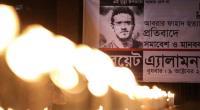 Bangladesh has been called "partly free" in terms of using the internet, according to the latest report of Freedom House, a global organization working for the expansion of freedom and democracy.
Bangladesh has been called "partly free" in terms of using the internet, according to the latest report of Freedom House, a global organization working for the expansion of freedom and democracy.
The organization assessed a total of 65 countries, in a survey titled "Freedom on the Net", on their levels of internet and digital media freedom.
Bangladesh scored 44 points - the highest being 100, and the lowest 0 on a 100-point scale - and was categorized as "partly free."
China scored the least - for the fourth consecutive year - with just 10 points, while Iceland topped the list with 95, this year.
The points were given based on the three categories - Obstacles to Access, Limits on Content, and Violations of User Rights.
Each of the categories includes 21 questions, under which there are nearly 100 sub-questions.
Based on the score, Freedom House assigns the following internet freedom ratings: 100-70= Free, 69-40= Partly Free, 39-0= Not Free.
This year's report, the ninth in its series, focuses on developments that occurred from June 2018-May 2019.
Of the 65 countries assessed, 33 have been on an overall decline since June 2018, compared with 16 that registered net improvements. The biggest score declines took place in Sudan and Kazakhstan followed by Brazil, Bangladesh, and Zimbabwe.
According to the report, in Bangladesh, citizens organized mass protests calling for better road safety and other reforms, and a general election was marred by irregularities and violence.
The government resorted to blocking independent news websites, restricting mobile networks, and arresting journalists, all to maintain control over the population and limit the spread of unfavourable information, the report says.
Mobile service was frequently restricted around the December 2018 general elections, and during demonstrations for improved road safety and other reforms in August 2018, Bangladesh Telecommunication Regulatory Commission (BTRC) throttled 4G and 3G service to limit the protesters’ ability to live stream and share video content.
In September 2018, the Digital Security Act (DSA) went into effect, with harsh punishments imposed to stifle online dissent, the report added.
More than 90 percent of users access the internet via mobile service providers, which recently began offering the faster 4G service.
This year's report by Freedom House focused on the crisis of social media. According to it, internet freedom is increasingly imperilled by the tools and tactics of digital authoritarianism, which have spread rapidly around the globe.
As a result of these trends, global internet freedom declined for the ninth consecutive year in 2019.


